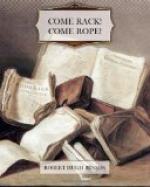But the return journey was another matter; for they needed no lanterns, and the dawn rose steadily overhead, showing all that they passed in ghostly fashion, up to final solidity.
It resembled, in fact, the dawn of Faith in a soul.
First from the darkness outlines only emerged, vast and sinister, of such an appearance that it was impossible to tell their proportions or distances. The skyline a mile away, beyond the Derwent, might have been the edge of a bank a couple of yards off; the glimmering pool on the lower meadow path might be the lighted window of a house across the valley. There succeeded to outlines a kind of shaded tint, all worked in gray like a print, clear enough to distinguish tree from boulder and sky from water, yet not clear enough to show the texture of anything. The third stage was that in which colours began to appear, yet flat and dismal, holding, it seemed, no light, yet reflecting it; and all in an extraordinary cold clearness. Nature seemed herself, yet struck to dumbness. No breeze stirred the twigs overhead or the undergrowth through which they rode. Once, as the two, riding a little apart, turned suddenly together, up a ravine into thicker woods, they came upon a herd of deer, who stared on them without any movement that the eye could see. Here a stag stood with two hinds beside him; behind, Robin saw the backs and heads of others that lay still. Only the beasts kept their eyes upon them, as they went, watching, as if it were a picture only that went by. So, by little and little, the breeze stirred like a waking man; cocks crew from over the hills one to the other; dogs barked far away, till the face of the world was itself again, and the smoke from Matstead rose above the trees in front.
Robin had ridden in the dawn an hundred times before; yet never before had he so perceived that strange deliberateness and sleep of the world; and he had ridden, too, perhaps twenty times at such an hour, with his father beside him, after mass on some such occasion. Yet it seemed to him this time that it was the mass which he had seen, and his own solitariness, that had illuminated his eyes. It was dreadful to him—and yet it threw him more than ever on himself and God—that his father would ride with him so no more. Henceforward he would go alone, or with a servant only; he would, alone, go up to the door of house or barn and rap four times with his riding-whip; alone he would pass upstairs through the darkened house to the shrouded room, garret or bed-chamber, where the group was assembled, all in silence; where presently a dark figure would rise and light the pair of candles, and then, himself a ghost, vest there by their light, throwing huge shadows on wainscot and ceiling as his arms went this way and that; and then, alone of all that were of blood-relationship to him, he would witness the Holy Sacrifice....
How long that would be so, he did not know. Something surely must happen that would prevent it. Or, at least, some day, he would ride so with Marjorie, whom he had seen this morning across the dusky candle-lit gloom, praying in a corner; or, maybe, with her would entertain the priest, and open the door to the worshippers who streamed in, like bees to a flower-garden, from farm and manor and village. He could not for ever ride alone from Matstead and meet his father’s silence.




